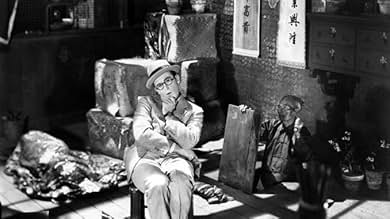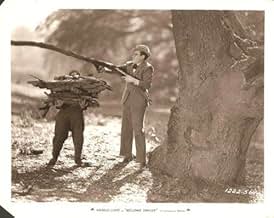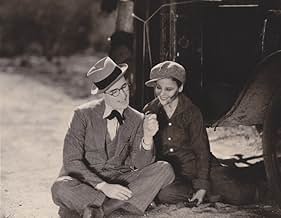Harold Bledsoe, a botany student, is called back home to San Francisco, where his late father had been police chief, to help investigate a crime wave in Chinatown.Harold Bledsoe, a botany student, is called back home to San Francisco, where his late father had been police chief, to help investigate a crime wave in Chinatown.Harold Bledsoe, a botany student, is called back home to San Francisco, where his late father had been police chief, to help investigate a crime wave in Chinatown.
Charles Middleton
- John Thorne aka The Dragon
- (as Chas. Middleton)
Will Walling
- Police Captain Walton
- (as William Walling)
Grady Sutton
- Man at Party (silent version)
- (scenes deleted)
Eddy Chandler
- Cop
- (uncredited)
Rae Daggett
- Woman Sitting in Police Station
- (uncredited)
Douglas Haig
- Buddy Lee
- (uncredited)
Edgar Kennedy
- SFPD Desk Sergeant
- (uncredited)
Tetsu Komai
- Florist Henchman
- (uncredited)
Wang Lee
- Chinaman with Queue
- (uncredited)
James B. Leong
- Florist Henchman
- (uncredited)
- …
Jim Mason
- Barry Steele
- (uncredited)
- …
Nelson McDowell
- 1st Train Passenger
- (uncredited)
Soo Hoo Sun
- Dead Chinese Man
- (uncredited)
James Wang
- Dr. Chang Gow
- (uncredited)
Featured reviews
This film was started as a silent and finished as a sound film. One would expect, then, to see some classic Lloyd "silent" comedy sequences, but this is a very disappointing and largely unfunny film. Lloyd's hallmark was always fresh, original, well-worked-out visual gags, but the poorly timed shenanigans here often remind one of something below the Three Stooges: the Bowery Boys, maybe. In virtually every other Lloyd film, regardless of whether he was shy, cocky, a success or a bumbler, his character was always inventive, thinking up ingenious solutions to the problems he found himself in. In this film, much of the humor is based on his simple stupidity. There are endless really primitive early action gags: one character gets the bad guys to chase him while the another stands behind a large crate and bats them on the head as they go by; a character takes a swing with a club to hit someone in front of him and accidentally hits someone creeping up behind him; a friend puts his hand on Lloyd's shoulder so he won't get lost in the dark, but when Lloyd gets back into the light the hand on his shoulder is that of a foe. These and other familiar lightweight gags abound, and the Lloyd's imaginative building of original gags is nowhere to be seen. In addition, nearly identical weak gags are sometimes repeated several times in a row. The bumbling around in a chinatown basement just seems interminable.
What happened? Lloyd's films before and after this one are all classics of top-notch comedy. This is a lapse that's unique in Lloyd's career.
What happened? Lloyd's films before and after this one are all classics of top-notch comedy. This is a lapse that's unique in Lloyd's career.
While one can admire Harold Lloyd's willingness to plunge into sound films, this effort is a huge letdown after the brilliance of his silent films, culminating in `Speedy.' Many of the gags go on WAY too long, and sound makes much of the slapstick more painful than funny. It may be that sound also contributes to making Lloyd's character extremely annoying, especially in the early reels. If that weren't enough, the dubbing process used in the scenes not reshot for sound is very primitive and distracting. Worth seeing for Lloyd fans, but not too funny.
Don't get me wrong, I love Harold Lloyd - both his talkies and silents. However, "Welcome Danger" was a real disappointment. It was Lloyd's first talking picture, started as a silent. When he finished he realized that sound had "arrived" and reshot it as a talking picture.
The awkwardness of the picture is no worse than any other early sound film, but the big problem is Harold's persona. As usual, he is the eager beaver trying to make good, but for some reason he makes his character out to be one of the most annoying personalities in film history. He is outright mean to people who really don't deserve it.
Lloyd plays Harold Bledsoe, a college student studying botany. His father is chief of police in San Francisco. After his father dies, Harold returns home to help the force with a crime wave in Chinatown. However, he becomes fascinated with fingerprint technology and soon has the department tied in knots with all of his cataloguing and fingerprinting. Soon the police department that welcomed him so heartily would do anything to get him out of their collective hair.
It is a shame this isn't on DVD because it is not THAT bad, and it is an important milestone in cinema history since it was Lloyd's very first talking picture. "Feet First" was his second talking effort, and a much better film too. One of the real treats of this film is an unbilled appearance by Edgar Kennedy as a desk sergeant in the San Francisco police department. He spends a long time on screen for him to have no credit whatsoever, but he does a wonderful job of playing the irascible beat cop we see in his later films.
The awkwardness of the picture is no worse than any other early sound film, but the big problem is Harold's persona. As usual, he is the eager beaver trying to make good, but for some reason he makes his character out to be one of the most annoying personalities in film history. He is outright mean to people who really don't deserve it.
Lloyd plays Harold Bledsoe, a college student studying botany. His father is chief of police in San Francisco. After his father dies, Harold returns home to help the force with a crime wave in Chinatown. However, he becomes fascinated with fingerprint technology and soon has the department tied in knots with all of his cataloguing and fingerprinting. Soon the police department that welcomed him so heartily would do anything to get him out of their collective hair.
It is a shame this isn't on DVD because it is not THAT bad, and it is an important milestone in cinema history since it was Lloyd's very first talking picture. "Feet First" was his second talking effort, and a much better film too. One of the real treats of this film is an unbilled appearance by Edgar Kennedy as a desk sergeant in the San Francisco police department. He spends a long time on screen for him to have no credit whatsoever, but he does a wonderful job of playing the irascible beat cop we see in his later films.
5woid
As you might have read here, this movie bridges silents and sound, having been shot without sound, and reshot when sound arrived -- and it appears that little of the silent material was used. There are silent-style titles between scenes, but basically we're watching an early sound film.
Sadly, like many early sound films, it's bogged down by the clumsy technology. The camera is static and actionless... in a Harold Lloyd movie! Harold has few action scenes, or even moments, for most of the film. Meanwhile, his character, speaking for the first time, turns out to be a smart-aleck, not at all like his sympathetic silent persona. Add to that the many moments when he bops somebody on the head or kicks them in the pants, which in sound comes off as painful more than comic. And the fact that he keeps casually destroying other people's property with no motivation makes him come off as, well, kind of a jerk.
Sound quality is not bad for the primitive era, but many scenes are obviously redubbed. And the dialogue! It's inane, which is bad enough. But worse, it's painfully slow, mostly overpronounced in projected, stage-actory voices. As a result, the film drags on at an adagio pace for just short of two hours. Way too long for any comedy.
And to read, again here, that it was previewed at THREE HOURS, tells me that this must have been one of the classic ill-fated Hollywood productions.
And yet... There are some real treats here. Edgar Kennedy is great as the irascible desk sergeant. He's on screen for a long time, but unbilled. Meanwhile, prominent billing goes to Charles Middleton as the weaselly John Thorne. This pleased me because four years later, Middleton and Kennedy both appeared (not together) in one of the one or two greatest comedies ever made, Duck Soup.
In Duck Soup, Kennedy has a series of great scenes -- as the lemonade salesman with Harpo, followed by Harpo, Chico, and the hat-and-leg-swapping routine. And when Freedonia goes to war, he gets to sit on Harpo in the bath.
Meanwhile, Charles Middleton, third-billed here, has merely a bit in Duck Soup, as the prosecutor at Chicolini's trial, playing straight man to Chico and Groucho. Short, but like every moment of Duck Soup, sublime.
Out of respect to the greatness of Harold Lloyd, I can't give this less than a five. But no more, either. It's for diehards & completists only. I'm one myself, but this is a long, hard slog.
Sadly, like many early sound films, it's bogged down by the clumsy technology. The camera is static and actionless... in a Harold Lloyd movie! Harold has few action scenes, or even moments, for most of the film. Meanwhile, his character, speaking for the first time, turns out to be a smart-aleck, not at all like his sympathetic silent persona. Add to that the many moments when he bops somebody on the head or kicks them in the pants, which in sound comes off as painful more than comic. And the fact that he keeps casually destroying other people's property with no motivation makes him come off as, well, kind of a jerk.
Sound quality is not bad for the primitive era, but many scenes are obviously redubbed. And the dialogue! It's inane, which is bad enough. But worse, it's painfully slow, mostly overpronounced in projected, stage-actory voices. As a result, the film drags on at an adagio pace for just short of two hours. Way too long for any comedy.
And to read, again here, that it was previewed at THREE HOURS, tells me that this must have been one of the classic ill-fated Hollywood productions.
And yet... There are some real treats here. Edgar Kennedy is great as the irascible desk sergeant. He's on screen for a long time, but unbilled. Meanwhile, prominent billing goes to Charles Middleton as the weaselly John Thorne. This pleased me because four years later, Middleton and Kennedy both appeared (not together) in one of the one or two greatest comedies ever made, Duck Soup.
In Duck Soup, Kennedy has a series of great scenes -- as the lemonade salesman with Harpo, followed by Harpo, Chico, and the hat-and-leg-swapping routine. And when Freedonia goes to war, he gets to sit on Harpo in the bath.
Meanwhile, Charles Middleton, third-billed here, has merely a bit in Duck Soup, as the prosecutor at Chicolini's trial, playing straight man to Chico and Groucho. Short, but like every moment of Duck Soup, sublime.
Out of respect to the greatness of Harold Lloyd, I can't give this less than a five. But no more, either. It's for diehards & completists only. I'm one myself, but this is a long, hard slog.
Welcome Danger was Harold Lloyd's first talkie, and the transition was not an easy one. Well, easier compared to those of Keaton and Chaplin, but Lloyd's silent pratfalls are poorly paced for a soundie and the film is desperately overlong. This is best reserved for hardcore Lloydites--beginners are advised to check out his mid to late twenties silents before investigating his talkies, of which this is the weakest.
Did you know
- TriviaBegan shooting as a silent in August, 1928 at Metropolitan Studios, it would become an agonizingly long and complicated production. It was finally released on October 12, 1929 as a talkie after largely being re-shot with another director - Clyde Bruckman as a talkie (marking the first time Lloyd worked from a script) and painstakingly edited down from an original 16-reels (some 2 hours and forty-five minutes) to 12-reels. The silent version cost $521,000 and another $281,000 was spent on the sound negative. While the novelty of hearing Lloyd speak made it his largest grossing hit since Vive le sport! (1925), those steep production costs resulted in a huge drop in net profits from his earlier features.
- GoofsAfter the dish washing scene ends between Harold and Billlie and the screen goes dark, CUT! can clearly be heard before the next scene begins.
- Quotes
Billie Lee: I just put my foot in the wrong place.
Harold Bledsoe: Oh, you did. Well, if you do it again, I'll put my foot in the right place!
- Alternate versionsThere is an all-silent version of this film distributed to unwired cinemas which includes more of the original "silent" version and is adapted with inter-titles for the newer sound sequences.
- ConnectionsFeatured in American Masters: Harold Lloyd: The Third Genius (1989)
Details
- Release date
- Country of origin
- Languages
- Also known as
- Welcome Danger
- Filming locations
- Production company
- See more company credits at IMDbPro
Box office
- Budget
- $979,828 (estimated)
- Runtime
- 1h 53m(113 min)
- Color
Contribute to this page
Suggest an edit or add missing content



















